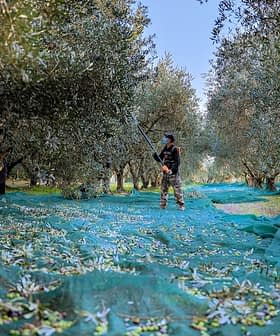In Defense of 'Black Fruity'
The French association Afidol shed light on the misinterpreted taste of "black fruity" oil and the controversy behind the ancestral tradition of controlled fermentation.
On the occasion of the Parisian exploration of new oils held last month, Olio Nuovo Days, the French association Afidol organized a conference on the theme “Black Fruity.”
The black fruity is our DNA, our historical heritage. It is the mother of all oils.
The conference was led by Afidol president Olivier Nasles who discussed the unpopular taste of the oil known in France as Fruité Noir and the controversy surrounding its production.
According to a 2008 European regulation, oils produced from ripe olives shouldn’t hold the designation ‘fruity’ as its definition doesn’t apply to the production method used to obtain the classic oil. Today, the term goût à l’ancienne (traditional) or olives mâturées (matured olives) are preferred.
A black fruity virgin oil derives from an ancestral tradition still maintained to date in the Provence region of France, though it is also known to exist in other Mediterranean regions. The oil is obtained from olives voluntarily fermented through a controlled and supervised storage during four to eight days before extraction.
For this process, olives must be of unquestionable quality and notably undamaged by the olive fly. The oil releases flavors of cacao, mushroom, vanilla, sourdough bread or even candid fruits, and no bitterness is noted.
The purpose of the fermentation is to lose the initial ardence of the olive oil by breaking vegetal notes and, by doing so, to develop different aromas that are milder, rounder and longer on the palate. However, its fusty flavor arouses controversy since fustiness is also a common defect caused by the unintentional fermentation that happens when olives wait too long before being milled and begin to decompose.
“Taste has a regulatory value. Olive oil is the only product worldwide that must pass before a panel test to be considered edible. They are telling us that a historical taste is not marketable nor consumable,” said Nasles, who believes that fustiness doesn’t necessarily mean defective if it’s well controlled.
“Clearly, if the procedure is unsupervised, it produces defective oils but with today’s modernized methods, farmers can master the quality of the oil,” said Nasles who said he has noted a “general mental block against the fusty taste.”

Oliver Nasles presenting ‘Black Fruity’ oils at Olio Nuovo Days.
And the process didn’t originate in France. “Black fruity is not a French typicality, storing olives in the mill is a Mediterranean tradition that began centuries ago,” Nasles said.
The production method was widespread in the past, however, with the implementation of modern equipment in the 1970s, growers started pressing their olives earlier, thus producing the green fruity. As a result, and with the new European norms, controlled fermentation prior to olive pressing was frowned upon and black fruity became a less wanted produce.
Refusing to conform to a European uniformity and to save a traditional know-how, the AOP Union and Afidol fought successfully to validate the procedure.
“The purpose of this conference is not to defend this particular taste but rather to clarify any misinterpretation around it and to underline the dogmatism of the panel test that suffocates some producers with their standardizations,” said Nasles.
During the discussions, four black fruity virgin oils were tasted by the audience composed of international producers and experts. The oils produced by the French mills Castelines, Moulin à Huile Margier and Le Carré des Huiles were either well received for their uncommon and particular taste or categorically rejected by those favoring a specific flavor spectrum.
“The black fruity is our DNA, our historical heritage. What upsets me is the general disdain for this ancestral tradition which is the root of what is today known as the green fruity. It is the mother of all oils,” concluded Nasles.








